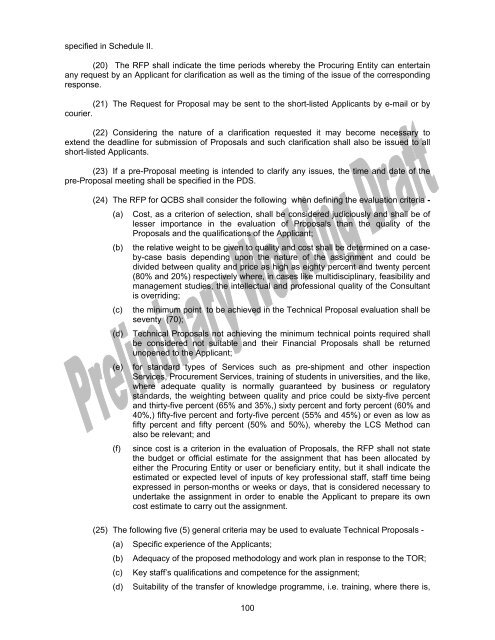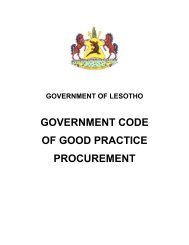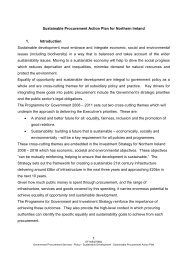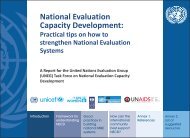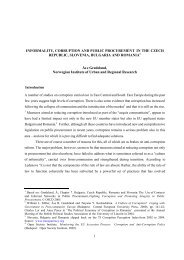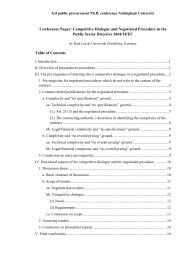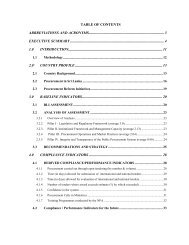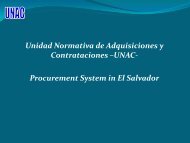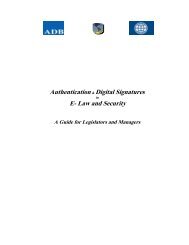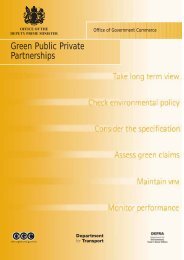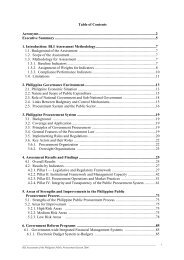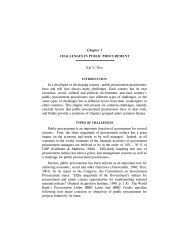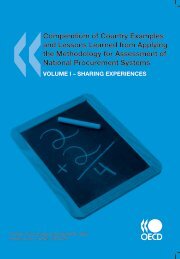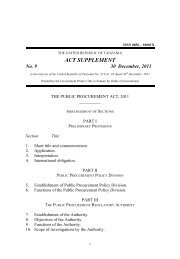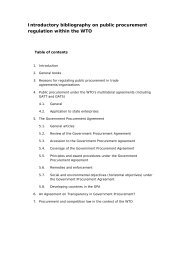The Public Procurement Rules 2008 - LGED
The Public Procurement Rules 2008 - LGED
The Public Procurement Rules 2008 - LGED
Create successful ePaper yourself
Turn your PDF publications into a flip-book with our unique Google optimized e-Paper software.
specified in Schedule II.<br />
(20) <strong>The</strong> RFP shall indicate the time periods whereby the Procuring Entity can entertain<br />
any request by an Applicant for clarification as well as the timing of the issue of the corresponding<br />
response.<br />
(21) <strong>The</strong> Request for Proposal may be sent to the short-listed Applicants by e-mail or by<br />
courier.<br />
(22) Considering the nature of a clarification requested it may become necessary to<br />
extend the deadline for submission of Proposals and such clarification shall also be issued to all<br />
short-listed Applicants.<br />
(23) If a pre-Proposal meeting is intended to clarify any issues, the time and date of the<br />
pre-Proposal meeting shall be specified in the PDS.<br />
(24) <strong>The</strong> RFP for QCBS shall consider the following when defining the evaluation criteria -<br />
(a) Cost, as a criterion of selection, shall be considered judiciously and shall be of<br />
lesser importance in the evaluation of Proposals than the quality of the<br />
Proposals and the qualifications of the Applicant;<br />
(b) the relative weight to be given to quality and cost shall be determined on a caseby-case<br />
basis depending upon the nature of the assignment and could be<br />
divided between quality and price as high as eighty percent and twenty percent<br />
(80% and 20%) respectively where, in cases like multidisciplinary, feasibility and<br />
management studies, the intellectual and professional quality of the Consultant<br />
is overriding;<br />
(c) the minimum point to be achieved in the Technical Proposal evaluation shall be<br />
seventy (70);<br />
(d) Technical Proposals not achieving the minimum technical points required shall<br />
be considered not suitable and their Financial Proposals shall be returned<br />
unopened to the Applicant;<br />
(e) for standard types of Services such as pre-shipment and other inspection<br />
Services, <strong>Procurement</strong> Services, training of students in universities, and the like,<br />
where adequate quality is normally guaranteed by business or regulatory<br />
standards, the weighting between quality and price could be sixty-five percent<br />
and thirty-five percent (65% and 35%,) sixty percent and forty percent (60% and<br />
40%,) fifty-five percent and forty-five percent (55% and 45%) or even as low as<br />
fifty percent and fifty percent (50% and 50%), whereby the LCS Method can<br />
also be relevant; and<br />
(f) since cost is a criterion in the evaluation of Proposals, the RFP shall not state<br />
the budget or official estimate for the assignment that has been allocated by<br />
either the Procuring Entity or user or beneficiary entity, but it shall indicate the<br />
estimated or expected level of inputs of key professional staff, staff time being<br />
expressed in person-months or weeks or days, that is considered necessary to<br />
undertake the assignment in order to enable the Applicant to prepare its own<br />
cost estimate to carry out the assignment.<br />
(25) <strong>The</strong> following five (5) general criteria may be used to evaluate Technical Proposals -<br />
(a) Specific experience of the Applicants;<br />
(b) Adequacy of the proposed methodology and work plan in response to the TOR;<br />
(c) Key staff’s qualifications and competence for the assignment;<br />
(d) Suitability of the transfer of knowledge programme, i.e. training, where there is,<br />
100


